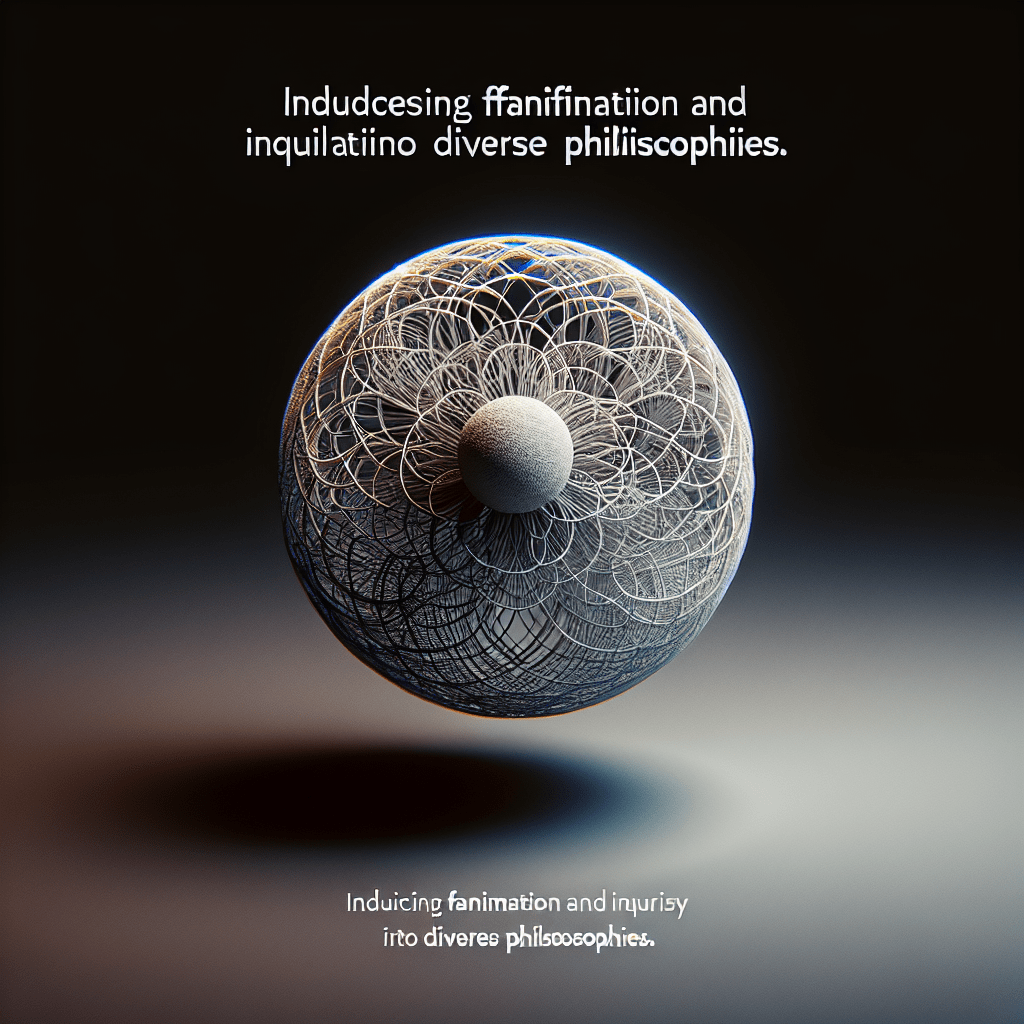Are you searching for a way to enhance your self-understanding? Look no further. Delve into the world of different philosophies and watch as a whole new realm of knowledge opens up before your eyes. By exploring various philosophical perspectives, you embark on a journey of self-discovery, gaining new insights into your own beliefs, values, and perspectives. Discover how the exploration of different philosophies can fuel personal growth and aid in the development of a deeper understanding of oneself.

The Importance of Self-Understanding
Recognizing the need for self-understanding
Self-understanding is a vital aspect of personal growth and fulfillment. It involves gaining insight into our thoughts, emotions, values, and motivations. Understanding ourselves allows us to make intentional choices, cultivate healthy relationships, and live a more meaningful life. Recognizing the need for self-understanding involves acknowledging that we are complex beings with intricate inner workings that shape our experiences and actions.
The benefits of self-understanding
There are numerous benefits to developing self-understanding. By exploring our own thoughts, emotions, and behaviors, we become more aware of our strengths and weaknesses. This self-awareness allows us to build upon our strengths and work on our weaknesses. Furthermore, understanding ourselves helps us align our actions with our values and live a life that is true to ourselves. It also enhances our ability to navigate challenges and make informed decisions. Ultimately, self-understanding empowers us to lead a more authentic and fulfilling life.
Introduction to Philosophies
Defining philosophy
Philosophy, in its broadest sense, is the study of fundamental questions regarding existence, knowledge, values, reason, ethics, and more. It involves critical thinking and contemplation about life’s big questions. Philosophy seeks to uncover the meaning behind our experiences and to understand the nature of reality, morality, and knowledge.
Exploring the diversity of philosophical perspectives
Philosophy encompasses a vast array of perspectives and ideas. Philosophers throughout history have proposed different theories and frameworks to make sense of the world and our place in it. From ancient Greek and Roman philosophers to Eastern and Western traditions, each philosophical perspective offers unique insights into the human condition and can contribute to our self-understanding.
Philosophy as a Tool for Self-Understanding
Examining the role of philosophy in self-discovery
Philosophy serves as a valuable tool for self-discovery and self-understanding. By engaging with philosophical ideas and concepts, we gain intellectual and emotional insight into our own beliefs, values, and perspectives. Philosophy encourages us to examine our assumptions, challenge our biases, and think critically about the world around us. Through this introspection, we can deepen our understanding of ourselves and the human experience.
Utilizing different philosophies for self-reflection
There is no one-size-fits-all approach to self-understanding. Different philosophies offer distinct lenses through which we can view ourselves and the world. By exploring various philosophical perspectives, we expose ourselves to different ways of thinking, allowing us to consider alternative viewpoints and evaluate our own beliefs and values. This process of self-reflection enables personal growth and the development of a more comprehensive understanding of ourselves.

Eastern Philosophies and Self-Awareness
Buddhism and the concept of impermanence
Buddhism, originating from ancient India, is centered around the belief in the impermanence of all things. The teachings of Buddhism emphasize the importance of self-awareness in understanding the nature of suffering and finding liberation from it. By recognizing the impermanence of both external circumstances and our internal experiences, we can cultivate detachment and cultivate a deeper understanding of ourselves.
Taoism and the pursuit of spontaneity
Taoism, originating from ancient China, emphasizes the importance of living in harmony with the natural flow of the universe. It encourages individuals to embrace spontaneity, simplicity, and balance. The Taoist philosophy encourages self-reflection by guiding individuals to let go of control and be present in the moment. This emphasis on spontaneity and non-action can help us let go of expectations and delve into a deeper understanding of ourselves.
Western Philosophies and Self-Understanding
Existentialism and the search for meaning
Existentialism, a philosophical movement that emerged in the 19th and 20th centuries, focuses on individuals as responsible creators of their own lives. It examines the meaning and purpose of existence in the face of a seemingly indifferent universe. Exploring existential philosophies can aid self-understanding by prompting us to question our own autonomy, choices, and the meaning we ascribe to our lives.
Stoicism and the art of acceptance
Stoicism, an ancient Greek philosophy, teaches individuals to cultivate inner peace and tranquility through acceptance of the things they cannot control. By focusing on personal virtue and ethical living, Stoicism provides a framework for understanding and accepting the limitations of our control. By practicing Stoic principles in our daily lives, we can develop resilience, moral fortitude, and a deeper understanding of ourselves.
Ancient Philosophies and Contemporary Application
Greek philosophies and personal virtues
Greek philosophy, with influential figures such as Socrates, Plato, and Aristotle, has had a profound impact on Western thought. Greek philosophy emphasizes personal virtues such as wisdom, courage, temperance, and justice. By exploring virtues and their application, we can gain insight into our own values and strive for moral excellence. These ancient philosophical teachings continue to be relevant in contemporary applications of self-reflection.
Roman philosophies and ethical conduct
Roman philosophy, heavily influenced by Greek thought, expanded on ethical principles and practical wisdom. The philosophy of Marcus Aurelius, known as Stoic Emperor, promotes self-discipline, resilience, and ethical conduct. By studying Roman philosophies, we can learn how to navigate challenges, develop discipline, and cultivate a deeper understanding of our own ethical frameworks.
Comparative Study of Philosophies
Identifying common themes and principles
Although philosophical perspectives may differ, there are often common themes and principles that emerge across various traditions. By engaging in a comparative study of philosophies, we can identify universal principles such as the pursuit of wisdom, the importance of moral ethics, and the quest for meaning. Recognizing these commonalities deepens our understanding of the human experience and allows us to find connections between seemingly disparate philosophies.
Recognizing contrasting ideas and perspectives
Alongside commonalities, exploring diverse philosophies also helps us recognize the contrasting ideas and perspectives that exist. Contradictory viewpoints challenge our own beliefs and assumptions, prompting us to think critically about our own perspectives. By exposing ourselves to conflicting ideas, we can gain a more nuanced understanding of ourselves and the complexities of the world.
Gaining Perspective Through Diverse Philosophies
Expanding our worldview through philosophical exploration
By engaging with diverse philosophies, we expand our worldview and gain a broader perspective on life. Each philosophical perspective provides a unique lens through which we can understand ourselves and the world around us. By appreciating the diversity of philosophical ideas, we cultivate empathy, open-mindedness, and a deeper appreciation for the complexity of human existence.
Challenging and questioning our own beliefs and assumptions
The study of philosophy encourages us to challenge and question our own beliefs and assumptions. By critically examining our worldview, we become aware of biases, prejudices, and limiting beliefs that may hinder our self-understanding. This willingness to critically evaluate our own perspectives fosters personal growth and a more accurate understanding of ourselves.
Developing a Personal Philosophy
Evaluating our values and beliefs
Developing a personal philosophy requires introspection and reflection on our values and beliefs. By evaluating what is truly important to us, we can align our actions with our core principles, leading to a greater sense of fulfillment. Developing a personal philosophy enables us to make decisions that are in line with our authentic selves and supports our self-understanding.
Synthesizing different philosophies into a unique perspective
Creating a personal philosophy involves synthesizing different philosophies into a unique perspective that resonates with our own experiences and beliefs. By drawing upon the insights from various philosophical traditions, we can create a holistic framework that guides our actions and shapes our understanding of ourselves. This personalized philosophy serves as a roadmap for self-discovery and growth.
Practical Application of Philosophies in Daily Life
Implementing philosophical principles in decision-making
The practical application of philosophies in daily life involves implementing philosophical principles to guide our decision-making process. By drawing upon the wisdom of various philosophical traditions, we can navigate complex choices with clarity and integrity. The application of philosophical principles in decision-making helps us align our actions with our values, leading to a greater sense of authenticity and self-understanding.
Cultivating self-awareness and introspection
Philosophical exploration fosters self-awareness and introspection. By engaging with philosophical ideas and concepts, we are encouraged to examine our thoughts, emotions, and behaviors, leading to a deeper understanding of ourselves. Cultivating self-awareness through philosophical inquiry allows us to lead more intentional lives, make informed choices, and nurture a more profound connection with our true selves.
In conclusion, self-understanding is crucial for personal growth and fulfillment. Philosophical exploration offers a valuable tool to deepen our understanding of ourselves. By delving into diverse philosophical perspectives, we expand our worldview, challenge our beliefs, and develop a more comprehensive understanding of our thoughts, emotions, values, and motivations. By integrating the wisdom of different philosophies, we can develop a personal philosophy that guides our actions and facilitates self-understanding. Ultimately, engaging with philosophy allows us to cultivate self-awareness, make informed decisions, and live a more authentic and meaningful life.

